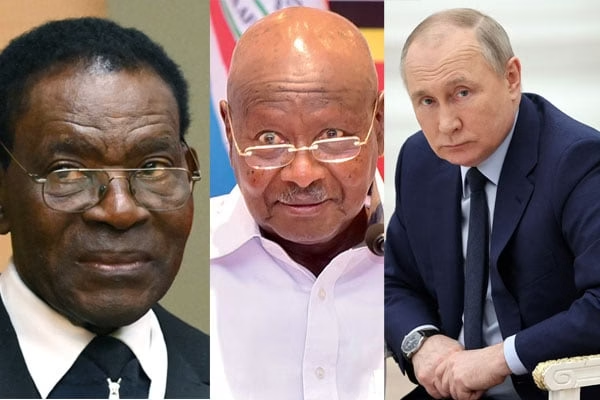
Presidents from Africa have shaped the political, economic, and social paths of their countries over the course of decades. Through a combination of electoral rigging, military influence, constitutional amendments and strategic alliances, these leaders have managed to hold onto power. Their prolonged reign is a reflection of the difficulties in establishing democracy throughout the continent as well as the tenacity of their political apparatus.
Here is a list of the top ten long-serving presidents in Africa;
1.Teodoro Obiang Nguema Mbasogo
Teodoro Obiang Nguema Mbasogo is the president of Equatorial Guinea and the longest-serving person in the world. In 1979, he took over after his uncle, Francisco Macías Nguema, was overthrown in a coup. Obiang has been in power for 46 years due to constitutional changes that permit indefinite reelection, a strong ruling party and the repression of dissent. His administration has been repeatedly criticized for its lack of transparency and violations of human rights, despite the nation’s oil wealth.
2. Paul BiyaPaul Biya
He is the second-longest-serving president of Africa, having been in office since 1982. During his 43-year tenure, he has been re-elected numerous times, frequently in controversial situations. Term limits were lifted by Cameroon’s parliament in 2008, allowing Biya to prolong his reign. Despite accusations of authoritarianism and electoral fraud, his government still enjoys the backing of foreign allies like France.
3. Denis Sassou Nguesso
The Republic of the Congo has had Denis Sassou Nguesso in office for a total of 40 years, first from 1979 to 1992 and then from 1997 to the present. After a civil war, he regained power, and constitutional amendments and contentious elections have helped him maintain his position of authority. Although Sassou Nguesso’s administration has presided over times of comparatively stable conditions, it has also been accused of corruption and human rights abuses.
4. Yoweri Museveni
In 1986, Yoweri Museveni led a successful armed uprising that brought him to power in Uganda. Although he started his 39-year term with pledges of democratization and reform, his administration has since lifted age and term restrictions, enabling him to run for reelection at any time. In addition to regional influence and economic growth, Museveni’s rule has been marked by a rise in authoritarianism and the repression of dissent.
5. Isaias Afwerki
Eritrea has been governed by Isaias Afwerki since gaining independence in 1993. There have been no national elections and he has led a one-party state for 32 years. His government is widely regarded as one of the most repressive in the world, with indefinite military conscription, strict media control and widespread human rights abuses.
6. Idriss DébyIdriss Déby
He was the leader of Chad for 31 years, from 1990 until his death in 2021. He was elected in a rebellion and kept power with the help of the military and constitutional amendments. Although Déby was instrumental in securing the region, especially in the fight against terrorism in the Sahel, his government came under fire for its authoritarianism and lack of democratic reforms.
7. José Eduardo dos Santos Angolan
Ruler José Eduardo dos Santos ruled for 38 years, from 1979 to 2017. He oversaw the Angolan Civil War and the nation’s rise to prominence as an oil producer. Despite playing a significant role in post-war reconstruction, Dos Santos’ administration came under fire for corruption and wealth disparity.
8. Robert Mugabe
Zimbabwean President Robert Mugabe served for 37 years, from 1980 to 2017. Mugabe was first praised for his contribution to Zimbabwe’s liberation, but his later years were characterized by political repression, economic collapse and contentious land reforms. Following a military intervention and massive public outcry, his rule came to an end.
9. Ismaïl Omar Guelleh
Since 1999, Ismaïl Omar Guelleh has ruled Djibouti for a total of 26 years. He took over from his uncle and has used Djibouti’s advantageous location to draw in foreign investment and military installations. Although the economy has grown under his leadership, worries about human rights and political freedoms still exist.
10. Paul Kagame
Paul Kagame has been the president of Rwanda for 25 years, having taken office in 2000. Although Kagame’s administration is widely credited with Rwanda’s economic transformation and post-genocide recovery, it has also come under fire for its authoritarian tendencies and repression of dissent. Amendments to the Constitution have allowed him to serve longer than originally planned.
Through a combination of institutional control, political savvy, and strategic alliances, these long-serving presidents have molded their countries. While some have delivered stability and development, others have been accused of undermining democratic principles. Their enduring presence in power underscores the complex interplay between governance, legitimacy, and accountability in Africa’s evolving political landscape.


